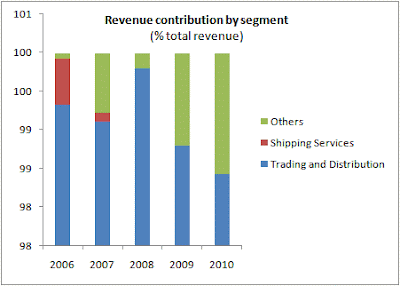In this part, we will take a look at the nature of business of Harrisons Holdings. Most of this information was extracted from their website, which I will quote in italics, but I have added some comments and observations of my own.
Better known previously as wholly owned subsidiaries of Harrisons and Crosfie1d PLC, Harrisons is one of the oldest, largest and most established sales, marketing, warehousing, distribution and services organization in Malaysia, particularly in East Malaysia where Harrisons has been in business for 91 years and has developed a very good distribution network that ranks amongst the best in the region.
Harrisons had its beginning as a relatively modest Harrisons and Crosfield trading outpost in 1918 in Sandakan, Sabah, and has today grown into a major Malaysian distribution and services company that can proudly take its place amongst the bigger corporations in terms of profitability, sales turnover, asset backing, employee size, business spread and geographical reach.
Harrisons also has a major presence in the shipping agency industry in East Malaysia where it represents a large number of major international and domestic shipping lines. In East Malaysia, Harrisons is also one of the few companies to maintain a network of 7 fully computerized travel ticketing and sales offices.
Harrisons' income is currently derived mainly from the marketing, sales, warehousing and distribution of consumer, building materials and engineering products, fine wines, agricultural and industrial chemicals, and the operation of shipping/logistics and travel agencies.
Chart 1 shows that the contribution from the trading and distribution segment pretty much dominates its revenue source. Over the past five years, it had consistently stayed above 98%, and in particular, the last 3 years, its shipping services did not contribute any revenue at all. The revenue from “other businesses” essentially comes from the provision of insurance and travel agency services, and investment holding, and do not really contribute much to the business.
 |
| Chart 1 |
However, Chart 2 shows that the contribution from the other businesses does play a larger role compared with that of revenue mainly because the profit margins are much higher. Nonetheless, it reported a loss in 2008, which should not come as a surprise seeing it was a recession year, given the nature of the business. From these two charts, it is clear that its core business is most definitely in trading and distribution. We will discuss more about its performance in another issue.
 |
| Chart 2 |
These businesses are conducted through its two groups of subsidiary companies, the Harrisons Trading Sabah Group and the Harrisons Trading Peninsular Group as follows:
In East Malaysia, the Harrisons Trading Sabah Group is involved in the marketing, sales, warehousing and distribution of fast moving consumer goods, building materials, engineering products and agricultural chemicals; operation of shipping and travel agencies in both Sabah and Sarawak;
In Peninsular Malaysia, the Harrisons Trading Peninsular Group is involved in the marketing, sales, warehousing and distribution of building materials, industrial and agricultural chemicals, and import and distribute fine wines; also freight forwarding and shipping (cruise business).
Presently, Harrisons has approximately 400 principals, and distributes approximately 11,000 product items to over 10,000 accounts spread all over Malaysia. It achieved a turnover exceeding RM1 billion in 2008.
The Harrisons Trading Sabah Group and the Harrisons Trading Peninsular Group together operate a total network of 27 branches strategically located, throughout Malaysia (11 in Peninsular Malaysia, 9 in Sabah and 7 in Sarawak) as shown in the map attached.
Harrisons employs about 1,000 staff and is highly regarded as an employer of choice, enjoying relatively low staff turnover in an industry where loyal, aggressive, yet approachable, management with deep industry-specific experience and proprietary knowledge is vital to ensure continued growth and profitability. This has been achieved through a decentralized organization structure that facilitates employee empowerment and initiative (enhancing speed to market), and organizes the business regionally for profit accountability and centrally at the group level for longer term strategic development.
Highly regarded by its business partners - principals as well as the trade - Harrisons has represented major multi-nationals for considerable lengths of time: Nestle has been with the group for 75 years, GAB for 52 years, Malex for 42 years and Maerskline for 31 years, to cite a few examples. Other well known companies represented by Harrisons include SCA Hygiene (Drypers), Reckitt Benckiser (Dettol, Shieldtox), Kao (Biore, Laurier), Ngan Yin and Cocolin.
Indeed, many principals today regard Harrisons as an integral part of their sales and marketing intelligence and research which are vital to their success in the markets where they have entrusted Harrisons with special distribution rights.
Not only are the principals are world-renowned companies, but they have stuck with Harrisons through thick and thin, most notably, Nestle, which has been with Harrisons for 75 years. This speaks volumes for the quality of service that Harrisons is providing. It would be easy for Nestle, or any of the other companies to switch distributors, but sticking out with Harrisons certainly suggests that the group must be doing something right.
Disclaimer: All company analyses, including the paper portfolio that appear in this newsletter are derived from facts gathered from various sources and the contributors' personal opinions and for education purposes. It is NOT an invitation to deal in securities, and especially not a recommendation for buying or selling any stock. The contributor(s) do not guarantee the accuracy of the facts being presented. The accuracy of such facts are only as reliable as the sources that they are obtained from. Please consult your investment advisers before acting on any information provided by the analyses here.
No comments:
Post a Comment